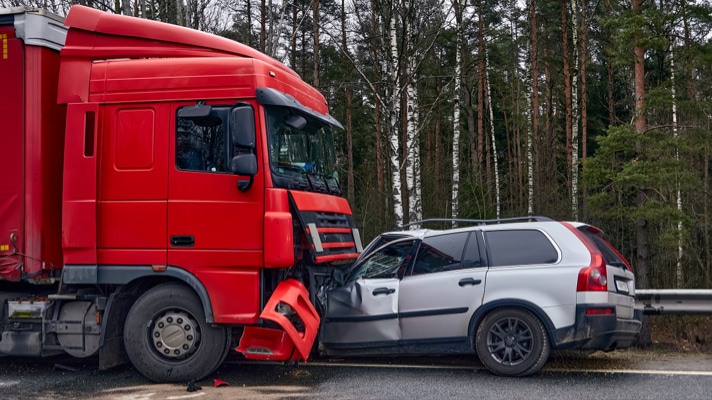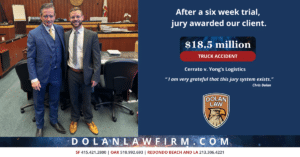This week’s question comes from Charles from Palo Alto, CA, who asks:
With so many tractor-trailer trucks on the road, I am concerned about getting into an accident with one of them. Should an accident occur with a commercial truck, how do their regulations impact the accident claim with the insurance company?
Dear Charles,
Understanding the impact of commercial truck regulations on an accident claim is crucial. This knowledge can empower you to navigate the legal process confidently and make informed decisions.
At the dawn of America, we relied on railroads to transport our goods across the country. With the rise of technology and the development of the combustion engine, trucks have become the way of the future. Regulations have changed over the years, and in 2000, Congress enacted the Federal Motor Carrier Safety Administration (“FMCSA”) under the Motor Carrier Safety Improvement Act of 1999 to establish and enforce safety regulations to reduce crashes, injuries, and fatalities with large trucks and buses. The FMCSA puts the burden on the employer truck company to monitor driver citations received by a driver, limits the hours a driver can be behind the wheel, and protects drivers from overworking/fatigue. There are also regulations about leaving the scene of a collision and driving under the influence of drugs and alcohol. These components have helped make the trucking industry safer for the motorists sharing the roads with the trucks.
According to the 2019 FMCSA Pocket Guide to Large Truck and Bus Statistics and the American Trucking Associations’ Economic and Industry Data, in 2019, large trucks traveled 297.6 billion miles. Trucks are involved in over half a million collisions. If you are involved in a crash with a commercial truck, there are many factors you should evaluate and consider when bringing and settling your claim.
It would help if you considered who is involved in the collision. Not only is the truck driver a defendant, but their employer, the truck owner, and the person who loaded the goods into the truck. The police report is a valuable resource for identifying the parties involved. You should also request the bill of lading and potentially the master transportation agreement to learn who put that truck on the road and in what capacity. While the TCR can be obtained pre-litigation, the rest of the information may only be available once you issue requests to produce documents or subpoenas in litigation.
Having an advocate who understands the unique and dangerous aspects of truck driving is not just essential but comforting in maximizing recovery and explaining to an insurance company why their truck is responsible. Moreover, knowledge of the size and shape of the truck components matters. Is this a tank body or a tractor-trailer? The tank body, typically filled with liquids, can be pushed by the momentum of the fluid as it moves within the tank, putting forces on the truck that can cause collisions. The weight and momentum of the load also affect a truck’s stopping distance. Trucks also require more distance to stop to risk jackknifing. Another risk is an ‘underride’. An underride occurs when a truck stops and a smaller passenger vehicle goes under the truck from behind. Underrides are fatal for the passenger vehicle nearly 100% of the time. Newer regulations on trucks (since 1998) require guards at the rear of the truck, but there is no requirement for older trucks to be retrofitted with these protections. Also, has the truck been properly and safely maintained? Are the brakes in good operating condition, and are the treads on the tires worn? Evaluating the truck’s condition may identify why a truck failed to stop in time or otherwise caused the collision and the extent of the damages suffered by an injured person. This can further be determined by obtaining devices such as an Electronic onboard recording device (EOBR) or an Automatic onboard recording device (ABORD) that can allow you to record speed, route, time of operation, and weight in the truck.
Understanding who might be responsible and how the collision occurred can significantly impact a claim. If you were involved in a truck crash, you should retain an attorney early. They can help develop a claim by evaluating the applicable regulations and gathering evidence like driver logs that show a defendant violated regulations. Finally, an attorney advocates for a client by not only making a claim to the insurance company but also maximizing a client’s recovery by emphasizing the negligence and liability of a truck defendant.
Christopher B. Dolan owns the Dolan Law Firm. Megan Irish is a trial attorney in our San Francisco office. We serve clients in the San Francisco Bay Area and California from our San Francisco, Oakland, and Los Angeles offices.
Email questions and topics for future articles to help@dolanlawfirm.com. Each situation is different, and this column does not constitute legal advice. We recommend consulting with an experienced trial attorney to understand your rights thoroughly.










